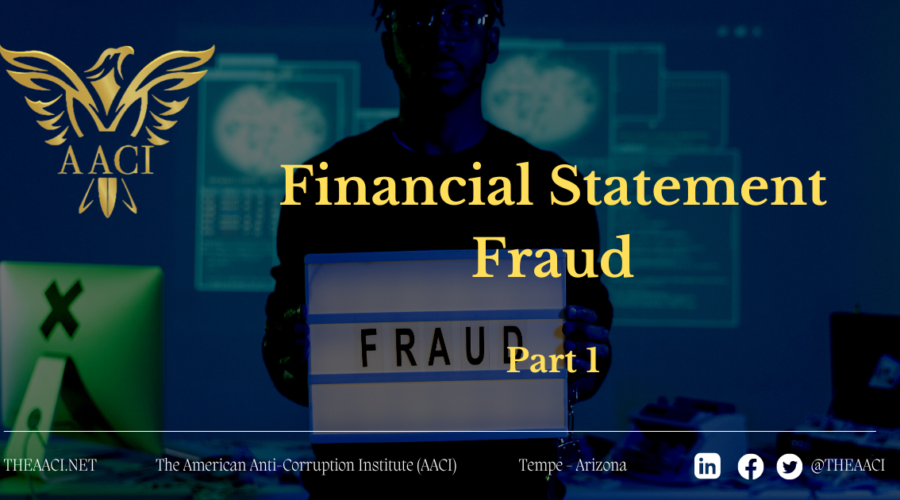October 24, 2022
Technical Staff
Definition 1
It is an intentional act that uses deception by misstating or omitting material information and results in a misstatement in financial statements to deceive financial statements users.
AU-C Section 240, Consideration of Fraud in a Financial Statement Audit, defines fraud as” an intentional act by one or more individuals among management, those charged with governance, employees, or third parties, involving the use of deception that results in a misstatement in financial statements that are the subject of an audit.”2
From a legal perspective, financial statement(s) fraud occurs when
1. Management prepares materially misstated financial statements, and
2. Management intent is to deceive financial statement user or users, and
3. A user or users justifiably rely on the materially misstated financial statements to make economic decisions, and
4. The user or users suffer damages as a result of their reliance on the materially misstated financial statements, and
5. A causal relationship exists between the user or users’ reliance on the materially misstated financial statements and the damages they suffer.
When all these conditions are met, it constitutes financial statement fraud.
Users of Financial Statements
Users of financial statements are investors, creditors, regulatory agencies, management, those charged with governance, and vendors. Each of these users depends on the financial statements to make economic decisions. The extent of financial statement information users utilizes differs from one user group to another. Users’ sophistication, business expertise, decision objectives, and other information may also differ among user groups. Therefore, management prepares what is called “general purpose financial statements.”
The Framework for the Preparation and Presentation of Financial Statements (i.e. GAAP, IFRS) presumes that users of the financial statements have reasonable knowledge of business and financial accounting matters including, but not limited, to the following:
1. Adequate understanding of the
a. financial statements’ content
b. notes to financial statements
c. accounting policies used to prepare and fairly present financial statements
2. Adequate understanding of the assumptions and principles used to prepare the financial statements (i.e., going concern, matching principle, and relevance, etc.)
3. Proper knowledge of financial statements analysis
4. Adequate understanding of the industry-relevant financial metrics
5. Sufficient knowledge of the nature of business
General Purpose Financial Statements
They are
1. A statement of financial position as at the end of the period,
2. A statement of comprehensive income for the period,
3. A statement of changes in equity for the period,
4. A statement of cash flows for the period,
5. Notes, comprising a summary of significant accounting policies and other explanatory information, and
6. A statement of financial position as at the beginning of the earliest comparative period when an entity applies an accounting policy retrospectively or makes a retrospective restatement of items in its financial statements or when it reclassifies items in its financial statements
The AACI firmly believes that users should also understand and have proper knowledge about
1. The management’s responsibility to prepare and fairly present the financial statements
2. The management’s responsibility for internal control
3. The auditor’s responsibility regarding fraud in a financial statement audit
4, The auditor’s responsibility in a financial statement audit
5. The oversight responsibility of the board for the financial reporting process
Users of financial statements should possess the proper knowledge and competency to understand the auditor’s report. Users must have appropriate accounting and auditing knowledge to make intelligent and sound economic decisions.
The Board of Directors
The board and its members have a duty of care. Such obligation implies that they should make informed decisions in the organization’s best interest. When the board discusses the auditor’s report and its accompanying financial statements, each board member should be competent to understand and smartly question the audited financial statements. Board members should not entirely rely on the audit committee’s work. The board’s ignorance and financial illiteracy are not an excuse for failing to understand audited financial statements. The board or its members may ask for an expert opinion about any facet of the audited financial statements to exercise its duty of care responsibly and prudently.
The board members’ collective reasonable accounting and auditing knowledge is a determinant factor for financial statement fraud, corruption, money laundering, and financing terrorism risks. It also forms one of the essential organizational pillars in setting the proper tone at the top.
1. Exam Unit, “Financial Statement Fraud,” in Certified Anti-Corruption Manager (CACM) Review Textbook, 2022 ed. (United States of America: The Exam Unit of The American Anti-Corruption Institute LLC., January 14, 2022) pp. 341-366.
2. AICPA, AU-C Section 240, Consideration of Fraud in a Financial Statement Audit, par. 11, 2017.
3. Click to read Financial Statement Fraud 2
Photo by Tima Miroshnichenko: https://www.pexels.com/photo/a-man-holding-a-letter-lightbox-6266500/











































